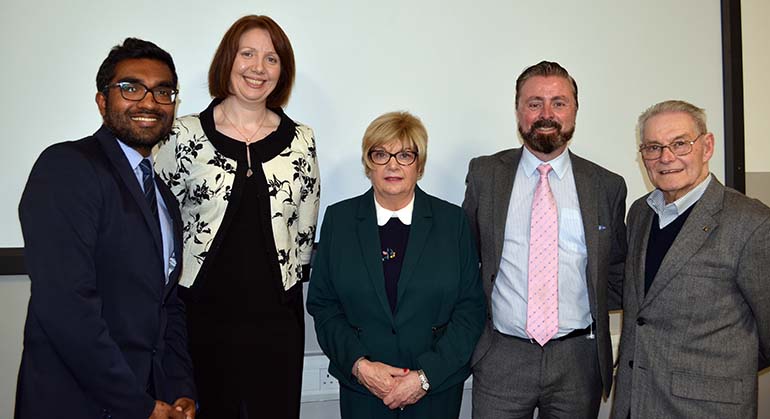Holocaust survivor Tomi Reichental speaks to Griffith College about his experiences
"This is an evening I will remember for the rest of my life".
Those are the words of a student who attended a talk at Griffith College's Dublin campus by Holocaust survivor Tomi Reichental. And it was a sentiment echoed by almost everyone this author spoke to on the night.
Reichental was invited to speak to students, staff and guests at the college by Dr Thamil Ananthavinayagan and Karen Sutton of the Law faculty and was truly one of the most moving and evocative events we've ever had the privilege of holding.
For anyone who isn't aware - Tomi Reichental was a prisoner at Bergen-Belsen concentration camp during World War II when he was only nine years' old. He was there with his mother and older brother Miki - and miraculously they survived their horrifying experience. But 35 members of his extended family - including cousins, aunts and uncles were not so lucky.
Reichental's father survived too - joining up with resistance forces in their native Slovakia. Reichental later moved to Dublin in 1959 - and barring a few years in Israel - has been here ever since.
The main emotion that came across from Reichental's talk at Griffith College was the empathy that he still possesses. Although his experience of being persecuted for the mere fact of being a Jew might have made a lesser person closed-minded and protective; Reichental's compassion shone through.
He feels that the Syrian people are going through a similar experience to that of the Jews in the 1930s. (Indeed he went on the record in 2015 saying that Ireland should take 10,000 refugees from Syria - more than five times the government agreed to). However, he did warn the audience that the experiences he talks about are not something from the annals of history - and that they must remain vigilant.
We said 'never again' but similar attrocities could happen again
“If you look at what is happening in Hungary, Poland or even the United States, we are seeing the same atmosphere," said Reichental. "After World War II, there was the motto of 'never again’. We thought that another Holocaust could never happen. But if we are not vigilant – similar atrocities can happen.”
"You only need some madman to come to power and atrocities can happen again. We can never let our guard down. We only need to look at what happened in Srebrenica. That was another genocide that happened in the middle of ‘civilised’ Europe and it didn’t happen in 1945 – it happened in 1995.
We look at what is happening now with Assad in Syria. He’s killing hundreds of thousands of his own people. I turn on the TV to see pictures of these people marching along the side of roads to escape persecution and they remind me of my own experience during the Holocaust.”
Mr Reichental urged the students in attendance to remain constantly vigilant. “You can never ever become a bystander. That is the worst thing that could happen. If you see somebody being bullied or attacked because of their religion or the colour of their skin then you must step in. You must stop it and let it be known that this is wrong. That’s what happened in the Holocaust. Nobody said anything. Even here in Ireland we see racism and religious discrimination and this cannot happen. You have to stay aware at all times or atrocities could happen again. Even in Ireland.”
Dr Thamil Ananthavinayagan, law lecturer at Griffith College said, “we need to listen to survivors like Tomi. In a way, he acts as a national conscience for us here in Ireland. There are many worrying trends around the world in terms of the growing acceptance of virulent right-wing politics and it is only by listening to people like Tomi that we can escape the perils of our history. Tomi’s importance to the national conversation in Ireland can not be understated.”

